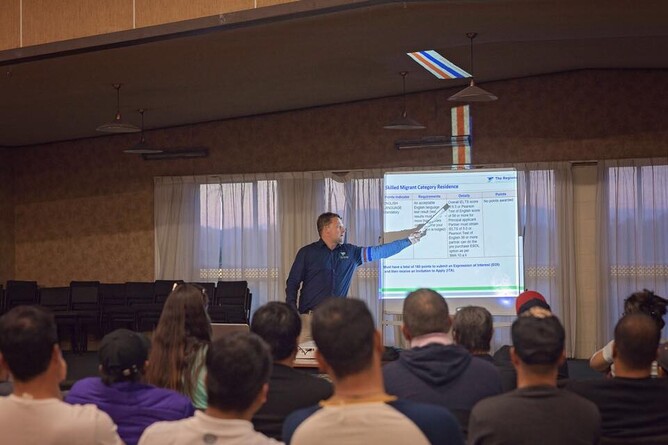We’re currently hosting a series of Immigration Seminars around the country with the purpose of taking a stand against a New Zealand Immigration policy that could have dire consequences for our country’s dairy farming sector.
What exactly are we taking a stand against? It’s a proposed policy change known as the stand down, which would see low skilled work visa holders stood down after three consecutive years on a one-year work visa.
But we want our stand to make waves, so that’s why we have set up an online petition and identified three key points we want the Immigration Minister, the Hon. Iain Lees-Galloway to respond to.
1. The proposed stand down
We would like to see this proposed stand down, which would come into effect as of 2020, be amended or, ideally, repealed. Why? Because standing down people who are working in trained and skilled roles in rural communities, where there is already a significant labour shortage, could cripple the agriculture sector and have severe implications for New Zealand’s economy.
Furthermore, it would cause irreparable damage to the rural communities so reliant on this skilled labour force.
Instead, we would like to see this proposal be transformed into a policy that better fits different areas of New Zealand and our economy.
On another note, we also want to see the term ‘low-skilled’ removed as it doesn’t reflect the skills of these work visa holders. They are not ‘low-skilled’. Getting out of bed at 4am, calving a cow in the middle of winter, getting kicked in the head by a heifer when milking does not sound like an easy, low-skilled job.
2. The Government’s pre-election promise of regionalising our skills shortage lists
Last year, one of the Government’s pre-election promises was to regionalise our skills shortage list. As part of this petition we are asking the New Zealand Government to please honour its word on this promise.
We also advocate the position of Herd Manager, based on two years’ experience within New Zealand and a New Zealand attained Level 3 ITO (1-year qualification attained while working), for all employees earning the mid-skilled wage (currently $20.65 per hour). These employees should be placed on the Immediate Skill Shortage List (ISSL) across all dairy focused areas of the nation.
In 2018, how can we not be utilising the technology and data available to distinguish the different needs of different parts of New Zealand and what their shortages might be? The Hawkes Bay example of leaving millions of dollars of apples rotting on the ground when there was no one to pick them is a painful example that immigration policy needs an urgent overhaul – as was proposed pre-election.
By the way ANZSCO, the Australian and New Zealand Standard Classification of Occupations, is 20 years out of date, and does not come close to describing what anyone, in any position on a dairy farm does. This should be looked at too.
3. Greater access to New Zealand residence for mid-level dairy staff
Our third point relates to the current Skilled Migrant Category (SMC) Residence programme. This programme is centred on a university qualification but that misses the point. We have a shortage of trades people and mid-level blue collar staff in New Zealand when many of our own people have attained degrees.
We seek immigration policy settings that bring in what we need, not more of what we already have.
Starting with the SMC Residence programme, especially outside of Auckland, the points system desperately needs to align with the employment sector needs of each region. We believe this can initially be achieved via an increase in SMC points for onshore work experience in critical areas – such as Dairy Farming and the Trades.
Sign the petition
So that’s what we’re standing for. But why are we doing it?
Because at The Regions we believe in the betterment of New Zealand. And we believe that betterment comes in uniting together to transform the lives of migrants wanting a better future; we believe that betterment comes in finding a solution to New Zealand’s dairy farm labour shortage.
So please join with us in taking a stand. You can sign the petition by licking on the link below. Our aim is to get 2,000 signatures. Will yours be one of them?
